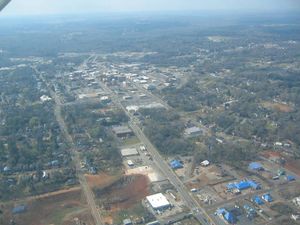
The downtown merchants were blown out a generation ago, replaced by a WalMart or, if the town is small enough, a Dollar General. But until recently there was life at the center. There was a bank, and an insurance agent. There were lawyers and doctors, self-employed. There were real estate offices and, near the WalMart, a car dealer. There was a newspaper.
These people had college educations, serious skills, and deep knowledge of the local scene. If someone wanted to move in, they had to go to the local real estate office, and ask the local bank for a mortgage. If someone wanted to move out, the bank was where they went for the money, the auto dealer was the only place to get a car, and the local insurance agent made the car legal. The newspaper knew where all the bodies were buried, and thus so did everyone else.
These were the gatekeepers of suburban order. The insurance men, the bankers, the mortgage men, were the paper pushers of financial stability. They played golf together. They ran the school board, and the city council. Even when the former factory workers descended into meth addiction, the gatekeepers knew their place was secure. They kept the crazy on the down-low.
Then something happened, in this decade, something that has yet to be given serious consideration by any political pundit.
The gatekeepers were replaced by apps.

This means more than unemployment at the center. It means more than the center of every small town, or suburb, being blown away. It means more than the gatekeepers losing their place.
This also opens the suburbs, the exurbs, and the small towns – the heart of what I call Trumpistan – to new people. Tech millionaires don’t need the gatekeepers. Gays and artists and immigrants don’t need the gatekeepers. If the local bank won’t back the new Syrian restaurant, they get the loan from somewhere else. They get on Yelp and the place is packed.

This atomizes people, and communities. We replace them with affinity groups. We bring our city lives to the country and there’s nothing the gatekeepers can do about it.
This is the heart of the fear that rides across Trumpistan today. It’s one thing for people without skills to be blown out, and blown away, by Chinese factories. It’s quite another when the local power structure, when the educated elite, are blown away by Silicon Valley’s apps. It’s social mobility, but also social dislocation. It’s an economic revolution that enables a social and a political one.
This is what the Trumpistanis are protesting, and there is no longer anyone who can keep them from it. The people who once would have done so are at the same rally.
When uncertainty comes to the door of the gatekeepers, who is there to keep order? When the bank is downsized, when the insurance agent can’t pay the rent, when even the lawyer starts losing business to Legalzoom.com and the doctor goes from being a small businessman and authority figure to a mere doc in a box, subject to being moved at the whim of a CRM program in a cloud somewhere, who is going to run the town?
Techland?
In Techland, we distrust authority. We don’t like to go out, especially to long, and boring, meetings. That’s why we have PCs and apps, to remove that clutter from our lives. We are not interested in running the city council meeting, or the school board. These are services we just want to buy.

Wall Street did not do this. Government did not do this. Technology did this. Technology will continue to march forward, there is nothing we can do to stop it.
Somehow we must adapt to it. But how can we answer that question, if no one is even asking it?









